By Claire Ballentine
Bitcoin, the world’s largest cryptocurrency, is seemingly everywhere these days. From fast food to sports and even the local Walmart, it’s finding a place in the mainstream. As an investment, its spectacular rally this year has cheered its adherents while raising the curiosity of the non-initiated. In 2021 alone, Bitcoin’s price has more than doubled. Time to invest yourself?
After years of being skeptical about bitcoin, Black Americans are leading the cryptocurrency revolution in 2021. A recent Harris poll shows that 23 percent of African-Americans own cryptocurrency, compared to 11 percent of white Americans and 17 percent for Hispanics. A 2021 University of Chicago survey of 1,004 young adults 18-29 found that 34 percent of traders were people of color who bought crypto over the past 12 months.

The easiest way to bet on Bitcoin is, of course, to buy it. But there are many reasons you might not want to take such a direct route. Maybe you know nothing about Bitcoin and want to get involved but prefer the familiarity of more traditional kinds of investments. Or maybe you know a lot about Bitcoin and don’t want to touch it, cautious about seemingly random price swings. Or you own Bitcoin already, and you’re looking to invest more broadly in the future of cryptocurrencies. The good news is, there are more ways than ever for U.S. investors to gain exposure.
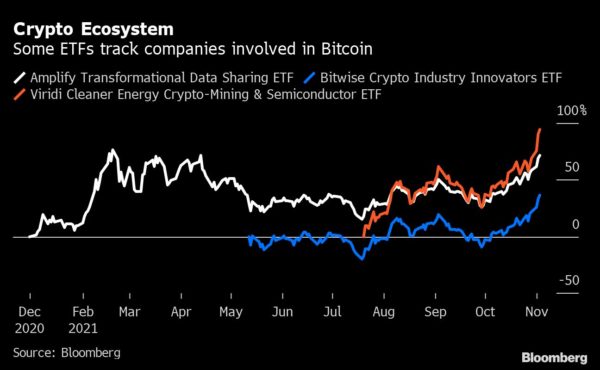
Here’s a rundown of the alternatives:
ETFs
While exchange-traded funds that track the price of Bitcoin have been available for a while in countries such as Canada and in Europe, it’s been a different story in the U.S., where they had long been blocked by regulators. That all changed in October, when the first Bitcoin-related ETFs were allowed to debut.
Importantly though, these products invest in Bitcoin futures, which track Bitcoin’s spot price indirectly through the use of contracts overseen by the Chicago Mercantile Exchange. (The Securities and Exchange Commission contends that this version has more investor protections than a regular Bitcoin ETF.) Two have launched so far: the ProShares Bitcoin Strategy ETF (BITO) and the Valkyrie Bitcoin Strategy ETF (BTF).
They each charge $9.50 for every $1,000 you invest, and involve the complicated world of futures, which are tools that traders use to bet on price movements. But these funds may be ideal for those new to the world of Bitcoin or those hoping to consolidate their holdings in a traditional brokerage account that doesn’t allow the actual cryptocurrency.
Some issuers such as Direxion Investments and Valkyrie Investments have sought to launch Bitcoin futures funds with leverage, which allow investors make supersized bets that the price of Bitcoin will rise or fall. Both pulled their applications from the SEC this week, likely after signals from U.S. regulators that they were unlikely to be approved, according to Bloomberg Intelligence. But it’s something to look out for in the future.The ETF industry is also hoping to see a fund that actually holds Bitcoin — more than a dozen issuers are interested in launching the products — but reluctance from the SEC means this is likely a ways off.

Buying Traditional Stock in a Bitcoin-Related Company
Companies have structures that might be more familiar to the average investor, such as executive teams that make decisions and financial results that have to be disclosed. That’s one reason some prefer this route to get indirect exposure to Bitcoin.
“It can be easier for people to get into industries that they already understand and who are adopting these technologies to make them more efficient,” said Sweta Bhargav, principal financial adviser at Adviso Wealth in Philadelphia. “It can be a better place to start for investors.”
Coinbase Global Inc. is a prime example. Because most of its revenue comes from fees it charges users to deposit and trade funds, the valuation of the crypto exchange fluctuates in close correlation with Bitcoin’s price. In a SEC filing, the company laid it out: “Our net revenue is substantially dependent on the prices of crypto assets and volume of transactions conducted on our platform.”
Alternately, investors could focus on companies that are bullish on Bitcoin and have substantial holdings. Tesla Inc. has about $1.26 billion in “digital assets” according to its latest financial statements.
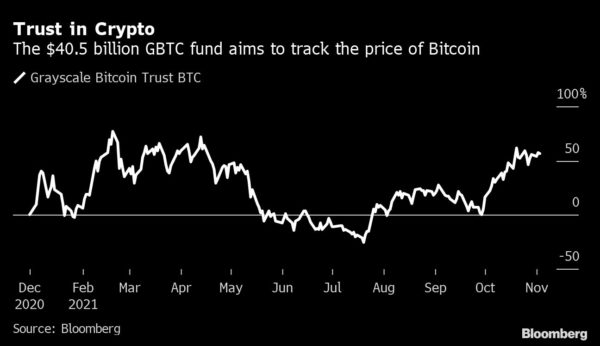
Other public companies that have substantial holdings include MicroStrategy Inc., an enterprise software firm had 114,042 units of Bitcoin as of the end of September; and Galaxy Digital Holdings Ltd., with hundreds of millions.
With companies that do things other than hold Bitcoin, you have to also evaluate their sector and individual product performance. The stocks’ performance will be influenced by a range of factors that individual companies have to contend with, not just the price of Bitcoin.
“The risk-return profile is not exactly the same, as you are also taking a position in the firms themselves and therefore take on exposure to their unique risks,” said Michael Kelly of Switchback Financial in Madison, Connecticut.
Year to date, Tesla has risen 73%, while MicroStrategy has gained 105% and Galaxy Digital rallied more than 200%.
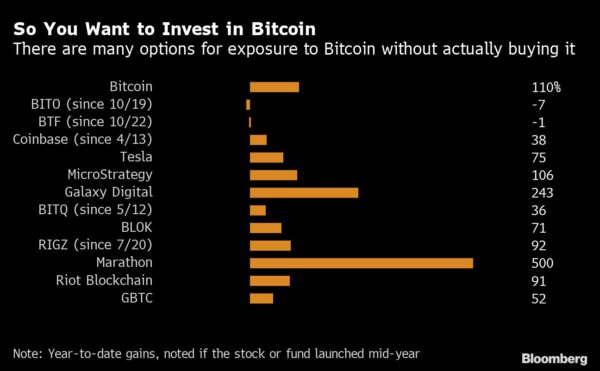
Stock ETFs
To invest in multiple companies at once, there are several exchange-traded funds that hold stocks of firms involved in the Bitcoin ecosystem.For instance, the Bitwise Crypto Industry Innovators ETF (BITQ) lists Galaxy Digital, Coinbase and MicroStrategy as its largest holdings. It costs $8.50 for every $1000 you invest.
Amplify Transformational Data Sharing (BLOK) fund has a similar aim, while the Viridi Cleaner Energy Crypto-Mining & Semiconductor ETF (RIGZ) offers an ESG twist. And more are coming: This week, Valkyrie filed to launch an actively managed fund that would invest in Bitcoin mining operations.
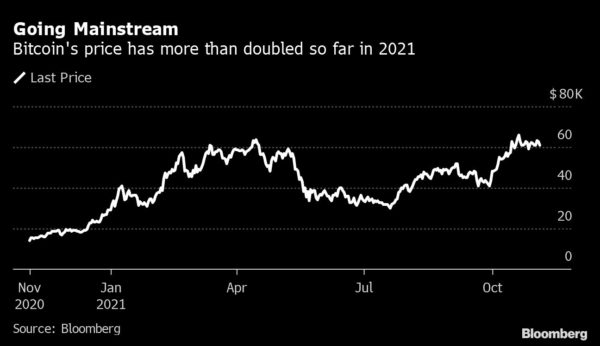
Investing in the Technology
Bitcoin is a digital currency: Each unit is an encrypted record stored in a public ledger called a blockchain, as you probably know by now. (And if you don’t, watch this.) By solving complex mathematical problems to verify transactions of the currency, individuals can be “rewarded” with new Bitcoin.
That opens the door for companies mining Bitcoin, using powerful computers to create units of the digital currency from scratch.
“You don’t have to be a computer geek anymore to mine,” said Julius de Kempenaer, senior technical analyst at Stockcharts.com. “There are companies who can do it for you.”
Marathon Digital Holdings Inc. and Riot Blockchain Inc. are two of the largest firms in the sector. On Marathon’s website, the Las Vegas company states that owning a stake “helps you gain exposure to Bitcoin in your portfolio without having to deal with the complications of holding the asset directly.” Castle Rock, Colorado-based Riot specializes in acquisitions of crypto-related businesses: In April, the company disclosed it was buying North America’s largest Bitcoin mining facility, Whinstone U.S., in a $651 million cash-and-stock deal.
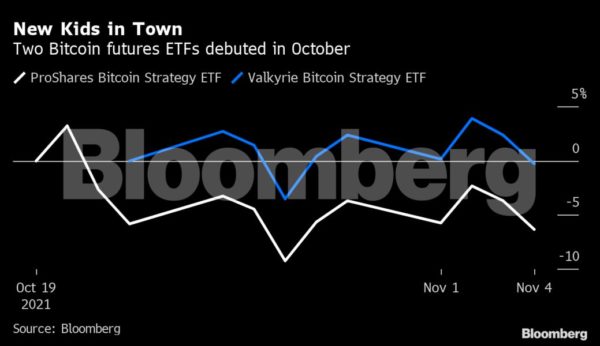
Old-School Trusts
Before the futures-based ETFs debuted, trusts were the go-to place to gain interest exposure to Bitcoin. The most well-known one is the Grayscale Bitcoin Trust launched by Grayscale Investments, a U.S. crypto investment firm, in 2013.
The downside is that Grayscale charges a 2% fee for its management of the fund. “There’s a lot more fees associated with it. If you own Bitcoin directly, you’re not paying any fees to hold it or trading fees for humans to work,” said Ryan Cole, a private wealth adviser at Citrine Capital, a San Francisco-based wealth management firm.
Moreover, the fund sometimes trades at a discount to the value of Bitcoin it holds.
However, the company has filed to convert the trust into an ETF. That would help resolve the discount issue, thanks to a feature in the ETF format that allows shares to be created and redeemed, keeping the price in line with that of the securities the fund tracks. Permission to convert is still awaiting the green light from the SEC.
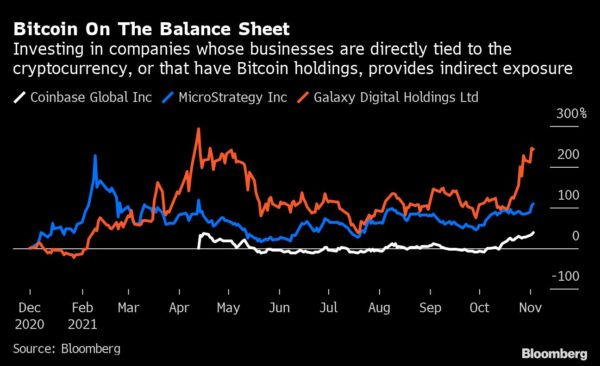
Then There’s Always the AltCoins
There’s also the option of buying one of the many alternative coins, or altcoins for short. Litecoin, created in 2011, has risen 60% this year, compared with about 110% for Bitcoin. Ethereum, the second-largest digital currency, has risen 510% over the same time period.
Dogecoin and Shiba Inu have made a splash recently, but the fundamental reasons anyone would invest in either of these “memecoins” are murky at best. Still, they’ve risen exponentially this year.
Or Just Buy Bitcoin
It used to be a lot more complicated to own a piece of Bitcoin — either a whole coin or a fraction of one. There were wallets to open, keys to keep track of and it oftentimes meant dealing with brand-new companies without track records or head offices you could call. Now, several firms — including exchanges such as Coinbase, money transfer apps like CashApp and brokerages such as Robinhood — have made it easy to buy Bitcoin and other cryptocurrencies, though fees and policies vary.
One of the latest is PayPal Holdings Inc.’s Venmo, which allows customers buy, sell and hold cryptocurrencies like Bitcoin and Ethereum. There’s even a “Cash Back to Crypto” feature for credit-card holders to automatically purchase crypto from their Venmo account using the cash back they’ve earned from purchases.
More stories like this are available on bloomberg.com.




